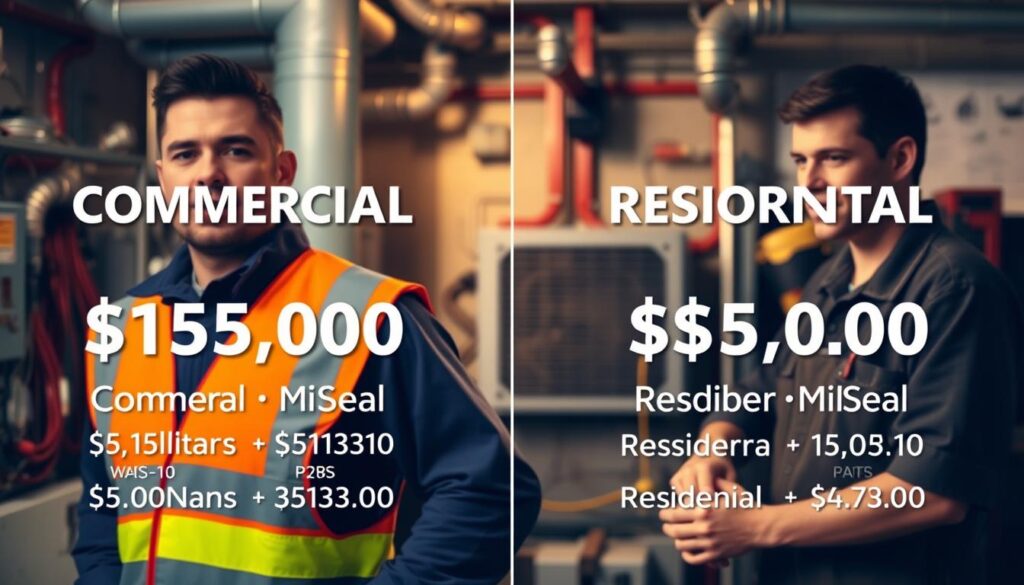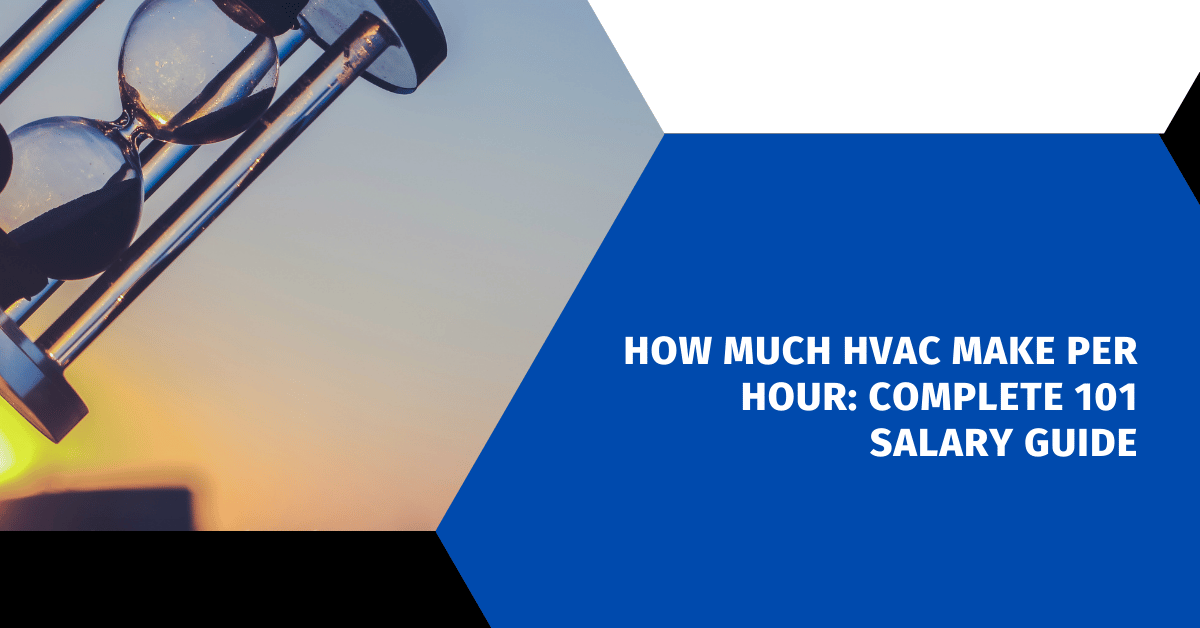Affiliate Disclosure
HVAC Guide Guys is a participant in the Amazon Services LLC Associates Program, an affiliate advertising program designed to provide a means for sites to earn advertising fees by advertising and linking to Amazon.
How Much HVAC Make Per Hour? Ever wondered how much HVAC workers really earn? Find out the hourly pay for HVAC technicians. This job could lead to a stable, well-paying career.

The HVAC field offers great financial chances for skilled workers. HVAC techs earn about $29.00 an hour on average. This means yearly salaries can be between $46,000 and $68,000. Pay depends on experience, where you work, and your specialty.
Knowing how much HVAC workers make per hour is key for those thinking about this career. HVAC techs are vital for keeping places comfortable. They work in homes and businesses, making sure the air is just right.
Key Takeaways
- Average HVAC technician hourly rate is $29.00
- Annual salaries range from $46,000 to $68,000
- Earnings vary by experience and geographic location
- Growing industry with strong job market
- Many specialty areas to explore
Table of Contents
Understanding HVAC Technician Salary Basics
Exploring HVAC careers shows a field full of promise and good pay. HVAC installers are key to keeping places comfy. Knowing about salaries helps you choose the right career path.
The HVAC world offers good pay, but it depends on several things. Your earnings can change based on your experience, where you work, your specialty, and demand.
Average National Hourly Rate
HVAC techs usually make $20 to $35 an hour if they’re experienced. Newbies start lower, and those with special skills earn more.
- Entry-level: $15-$22 per hour
- Mid-career: $22-$30 per hour
- Experienced professionals: $30-$45 per hour
Salary Range Overview
| Experience Level | Annual Salary Range | Hourly Rate |
|---|---|---|
| Entry-Level | $31,000 – $40,000 | $15 – $22 |
| Mid-Career | $40,000 – $55,000 | $22 – $30 |
| Experienced | $55,000 – $80,000 | $30 – $45 |
Industry Growth Projections
The HVAC field is growing fast, with a 5% job increase in the next ten years. This means more jobs and higher pay for skilled workers.
Invest in your skills, stay updated with technology, and you can maximize your earning in this vital and changing field.
Explore Our HVAC Shop
Looking for top-rated HVAC tools, parts, and accessories? Visit our shop and find the perfect solution for your needs.
Visit the ShopHow Much HVAC Make Per Hour Across Experience Levels
Your earnings in the HVAC field can really grow as you gain more experience. Knowing how salaries increase helps you plan your career and set income goals.
At the start, HVAC technicians earn about $22 an hour. In the first 0-5 years, you build basic skills and get real-world experience.
- Entry-Level (0-5 years): $22/hour
- Mid-Career (6-9 years): $27.65/hour
- Experienced Managers (10+ years): $32.83/hour
As you get better, your earnings go up a lot. Technicians with 6-9 years of experience make about $27.65 an hour. This is because they have more technical skills and work more efficiently.
Those with 10 or more years of experience can earn up to $32.83 an hour. At this point, your skills, certifications, and leadership abilities really pay off.
“Your earning in HVAC grows a lot with experience and learning new skills.” – Industry Expert
Making smart career choices, like getting more certifications, can help you earn more. It also opens up better job opportunities.
Geographic Salary Variations in the HVAC Industry
Your HVAC salary can change a lot based on where you work. The location you choose greatly affects your earnings in the United States. Knowing these differences can help you make better career choices and earn more.
Different places in the country pay HVAC technicians differently. Things like the local economy, demand for services, and cost of living all play a part in how much you earn.
Top-Paying States for HVAC Professionals
Some states pay HVAC technicians more than others. The highest paying areas include:
- Alaska: Highest average hourly rates
- Massachusetts: Competitive compensation packages
- New Jersey: Strong union representation and benefits
- California: Metropolitan areas with high demand
- District of Columbia: Premium salaries for skilled technicians
Lowest-Paying States
On the other hand, some states pay less due to lower demand and costs:
- Mississippi: Limited industrial infrastructure
- Arkansas: Lower economic development
- South Dakota: Smaller urban centers
- West Virginia: Reduced commercial growth
Metropolitan Area Salary Differences
| Metropolitan Area | Average Hourly Rate | Annual Earnings |
|---|---|---|
| San Francisco, CA | $30.87 | $64,200 |
| New York City, NY | $29.45 | $61,250 |
| Boston, MA | $28.63 | $59,550 |
| Chicago, IL | $26.92 | $55,980 |
Choosing the right location can greatly increase your earnings. Cities with strong infrastructure and tech industries usually offer better pay.
Explore Our HVAC Shop
Looking for top-rated HVAC tools, parts, and accessories? Visit our shop and find the perfect solution for your needs.
Visit the ShopCommercial vs Residential HVAC Pay Scales

Looking into hvac hourly compensation shows big differences between commercial and residential HVAC. Commercial HVAC techs make more because their work is complex and on a bigger scale.
The pay for HVAC pros changes a lot between these areas. Home HVAC techs work on smaller systems in houses. But, commercial techs deal with bigger, more complex setups in places like offices, hospitals, and factories.
- Commercial HVAC techs usually earn 15-25% more than those working on homes
- Big, complex systems need advanced skills
- Commercial jobs often use more advanced equipment
What affects how much commercial HVAC techs get paid includes:
- How complex the system is
- How long the project lasts
- Special certifications needed
- Handling risks
Choosing commercial HVAC can really increase your earnings. While home HVAC work is steady, commercial techs get paid more and need more skills.
Commercial HVAC work needs precision, technical know-how, and solving complex problems.
Choosing between commercial and residential HVAC affects your future earnings. Think about your skills, interests, and income goals when deciding.
Education and Certification Impact on Earnings
Boosting your HVAC career needs smart education and certifications. These can greatly increase your hvac technician hourly pay. They also lead to better-paying jobs in the field.
Investing in your growth can really up your hvac installer wages. Certifications show you’re skilled and serious about your work. This makes you more valuable to employers.
Required Certifications for Entry
To kick off your HVAC career, you’ll need some key certifications:
- EPA Section 608 Certification (required for refrigerant handling)
- State-specific HVAC licensing
- Journeyman HVAC technician certification
Optional Certifications for Increased Earnings
Get specialized certifications to up your market worth:
- NATE (North American Technician Excellence) Certification – Shows off your advanced skills
- Industrial Refrigeration Certification
- Commercial Refrigeration Certification
- Energy Efficiency Specialist Credential
Continuing Education Benefits
Keep learning to stay ahead in HVAC. Technicians who keep up with education often earn more. They also get:
- Higher salary chances
- More job openings
- Deeper technical knowledge
- A competitive edge in the job market
Professional growth is the key to maximizing your earning in the HVAC industry.
Explore Our HVAC Shop
Looking for top-rated HVAC tools, parts, and accessories? Visit our shop and find the perfect solution for your needs.
Visit the ShopCareer Advancement and Salary Growth

Starting a career in HVAC can lead to many opportunities for growth and higher pay. As you get more experience and skills, you can earn more. This is true for both hvac repair rates and hvac service costs.
Your HVAC career can take many paths:
- Entry-level technician
- Specialized service technician
- Senior technician
- HVAC supervisor
- Business owner or independent contractor
Experienced HVAC pros can make more money by making smart career choices. HVAC supervisors with 7+ years of experience can earn up to $87,700 a year. This shows how much you can earn by moving up in your career.
| Career Stage | Potential Annual Earnings | Key Skills Required |
|---|---|---|
| Entry-Level Technician | $35,000 – $45,000 | Basic technical knowledge, apprenticeship training |
| Specialized Technician | $50,000 – $65,000 | Advanced certifications, specific system expertise |
| HVAC Supervisor | $70,000 – $87,700 | Management skills, extensive technical experience |
Getting into new tech like smart homes or energy-saving systems can really boost your pay. Always keep learning and getting new certifications. This is how you move up in the HVAC world.
Factors Affecting HVAC Technician Compensation
Understanding how much HVAC technicians earn involves looking at many factors. It’s not just about your skills or how long you’ve been working. Several elements can greatly affect your salary.
The HVAC industry has its own economic rules. Your salary can change based on the market, the time of year, and the overall economy.
Industry Demand Dynamics
How much HVAC technicians make depends a lot on demand. When there’s a lot of building going on, more skilled workers are needed. This means better pay and more jobs.
- Construction sector growth increases HVAC job opportunities
- Energy efficiency initiatives create new market segments
- Technological advancements expand service requirements
Seasonal Work Variations
HVAC work changes with the seasons, with busy times in summer and winter. These changes can really affect how much you make each year. Busy seasons mean more overtime and emergency calls, which can increase your earnings.
“In HVAC, your ability to adapt to seasonal changes can make a substantial difference in your financial success.” – Industry Expert
Economic Conditions Impact
The state of the economy also affects HVAC technician pay. When the economy is down, there’s less building, which can mean fewer jobs. But when the economy is growing, there’s more building and more need for HVAC services.
Your salary is shaped by your skills, the market, and the economy. Knowing these factors can help you make the most money in the HVAC field.
Explore Our HVAC Shop
Looking for top-rated HVAC tools, parts, and accessories? Visit our shop and find the perfect solution for your needs.
Visit the ShopComparison with Other Trade Professions
Exploring hvac income is key. It shows how HVAC technicians compare to other skilled trades. Your choice affects your future earnings.
HVAC workers get good pay, similar to plumbers and electricians. The salary comparisons are quite interesting.
| Trade Profession | Average Hourly Rate | 10+ Years Experience Rate |
|---|---|---|
| HVAC Technicians | $25.50 | $32.83 |
| Plumbers | $26.52 | $31.16 |
| Electricians | $27.01 | $29.62 |
What makes trade earnings different includes:
- Specialized skill requirements
- Market demand
- Complexity of work
- Geographic location
Your HVAC career has special benefits. Experienced technicians often earn more than others, thanks to their skills in commercial HVAC or advanced tech.
The skilled trades offer strong career paths with good pay and growth chances.
By always learning and specializing, you can boost your hvac pay. This leads to a rewarding and stable HVAC career.
Benefits and Additional Compensation
Looking at how much HVAC pros make per hour, it’s key to see more than just the base pay. The hvac professional pay scale comes with a wide range of benefits. These can really boost your total earnings.
Most HVAC companies give a great benefits package to draw in and keep the best workers. These extra pay parts can greatly increase what you get from your job.
- Health Insurance Coverage
- Retirement Savings Plans
- Paid Time Off
- Performance Bonuses
- Tool Allowances
Now, let’s look at what extra pay HVAC techs usually get:
| Benefit Type | Estimated Annual Value |
|---|---|
| Health Insurance | $6,000 – $12,000 |
| Retirement Matching | $1,500 – $3,500 |
| Performance Bonuses | $1,000 – $5,000 |
| Tool Allowance | $500 – $2,000 |
Some forward-thinking companies offer special perks to stand out in the HVAC job market. These can include gym memberships, chances to grow professionally, and training programs paid for by the company.
When you’re talking about your HVAC career, think about the whole package. The hourly rate is important, but the extra benefits can really change your financial outlook.
Explore Our HVAC Shop
Looking for top-rated HVAC tools, parts, and accessories? Visit our shop and find the perfect solution for your needs.
Visit the ShopFuture Outlook for HVAC Salaries
The HVAC industry is on the verge of big changes. These changes will bring new chances for better pay for HVAC technicians and installers. New technologies and shifts in the market are making the field more exciting for skilled workers.
Technological Innovations Driving Change
Smart home systems and energy-saving tech are changing the HVAC world. Your chances of making more money will grow as you learn about the latest tech. This includes:
- Internet of Things (IoT) connected HVAC systems
- Advanced building automation technologies
- Renewable energy integration
- Artificial intelligence-powered climate control
Market Trends Influencing Salaries
The Bureau of Labor Statistics says the HVAC industry will grow a lot. With a focus on green buildings and sustainability, you can find new ways to earn more.
Growth Opportunities on the Horizon
Those who keep learning and stay flexible will see big pay increases. Getting good at things like solar-powered HVAC systems and energy management can really boost your value in the market.
“The future of HVAC is not just about fixing systems, but about creating intelligent, sustainable environments.” – Industry Expert
By keeping up with new tech and learning specialized skills, you can grow your career. You’ll also get better pay in the changing HVAC world.
Conclusion
The HVAC industry is full of chances for skilled workers looking for stable jobs. Senior technicians can earn up to $77,200 a year. Learning and improving your skills are key to making good money.
How much you earn depends on your education, certifications, and specializations. The HVAC field has many ways to grow, from starting jobs to advanced roles. Your location, the demand for your skills, and new technologies also play big roles in your career and pay.
As new technologies and energy-saving needs grow, HVAC techs with advanced skills will be in high demand. By getting specialized training, getting the right certifications, and keeping up with trends, you can find great jobs in this field.
If you’re thinking about starting or growing your HVAC career, the outlook is bright. With more jobs coming and good pay, investing in your skills can lead to big rewards in this growing field.

